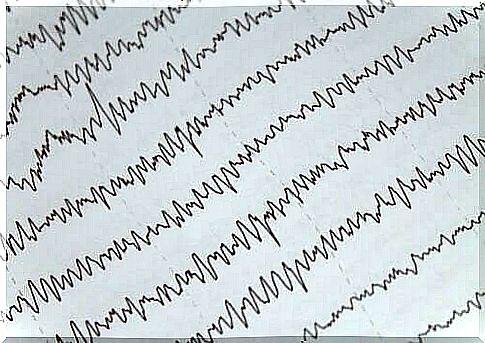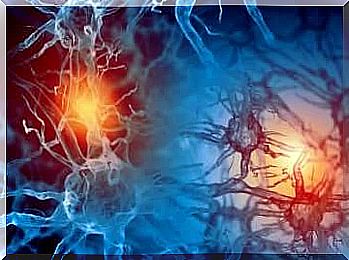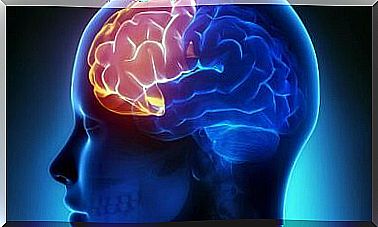Epilepsy And Breastfeeding
Epilepsy and breastfeeding are a combination that raises questions for mothers with the disease. In this article, we will try to elucidate these concerns and give advice on breastfeeding, despite medication.

Most of the time, breastfeeding is recommended for all newborns to mothers with epilepsy. Indeed, the use of anti-epileptic drugs does not generate side effects in the nursing baby.
This is a very common question among mothers who suffer from epilepsy when it comes to breastfeeding. Indeed, it is a subject that must be considered in this case. The care of the child also depends on a correct diet as an axis of growth.
In this article, we will see some recommendations to take into account in order to minimize any possible side effects. We start from the assertion that epilepsy and breastfeeding are compatible.
Some definitions around epilepsy
Epilepsy is defined as a seizure disorder caused by an underlying chronic process in a person’s brain. This process results in discharges followed by neuronal impulses, synchronously.
On the other hand, convulsion or seizure is a sudden episode produced by these abnormal and excessive discharges, or by synchronous neuronal activity in the brain. This then creates an imbalance between arousal and inhibition of the brain.
It is important to specify that the presence of one or more seizures, the cause of which is correctable or preventable, is not synonymous with epilepsy. In epilepsy, as we have already mentioned, there is an alteration in the brain that cannot be corrected.
On the other hand, there are different types of epilepsy. Each has a specific treatment and prognosis. The most common approach is the use of anti-epileptic drugs.

What are the antiepileptic treatments?
Treatment of a patient with epilepsy focuses on the administration of anti-epileptic drugs. As we have already pointed out, this is the main approach to this type of disease.
In addition, the ideal scenario is to achieve complete prevention of the onset of seizures, without the presence of side effects, or at least minimizing them. There is only one preferred drug used. This is called the minimum effective dose in monotherapy.
It is advisable to always start with only one antiepileptic medicine and then increase the dose if necessary. In some cases more resistant to therapy, several drugs will be prescribed.
In general, finding the right treatment is a process of adaptation that can take a long time. To make these adjustments, measurement and dosage studies are performed on the patient.
Epilepsy during breastfeeding
Today, epilepsy and breastfeeding are compatible. However, it is very important for these mothers to be followed as closely as possible during their pregnancy. As well as during the postpartum period.
During pregnancy, special care will be taken in measuring antiepileptics in the blood. This is because pregnancy can decrease the drug distributed throughout the body. In addition, there is an increased risk of seizures for pregnant women. Therefore, it may be necessary to increase the doses of the drugs at this stage.
After childbirth has passed, there are some aspects that may change the treatment and care while breastfeeding:
- Dose of antiepileptic drug used: Usually the dose is adjusted again. It is almost always a decrease.
- Possible onset of seizures due to lack of sleep. This is why it is strongly recommended to get good rest because lack of sleep is a trigger for epileptic seizures.
- Safety precautions for the newborn: it is preferable to avoid co-sleeping, and to bathe or wash the baby accompanied.
As we have said, feeding through breastfeeding is not prohibited. On the contrary, whenever possible, it is advisable to maintain it exclusively for six months. Then to continue it over two years as part of a complementary diet.
Medicines for epilepsy and breastfeeding

There are many antiepileptic drugs. They pass into breast milk in varying amounts.
However, no side effects in the newborn have been noted among the vast majority of antiepileptics used. Some of them do not enter breast milk at significant levels, and others do.
The choice of drug by the neurologist will take all these elements into account. In addition, it is important that the mother does not miss a dose. Although it is better to divide the daily dose or allow a few hours to pass between taking the medicine and breastfeeding the baby.
Is it safe for the baby?
In cases where the drug has passed through breast milk heavily, the newborn may be drowsy, have difficulty breastfeeding, or be irritable. Therefore, strict dosage control, based on maternal blood levels, is necessary.
Finally, by way of conclusion, we would like to stress the importance of close monitoring by the neurologist during pregnancy and breastfeeding, with the aim of taking care of the health of the newborn and his mother. Only a professional can define the dosage of the drugs and their possible suspension.









